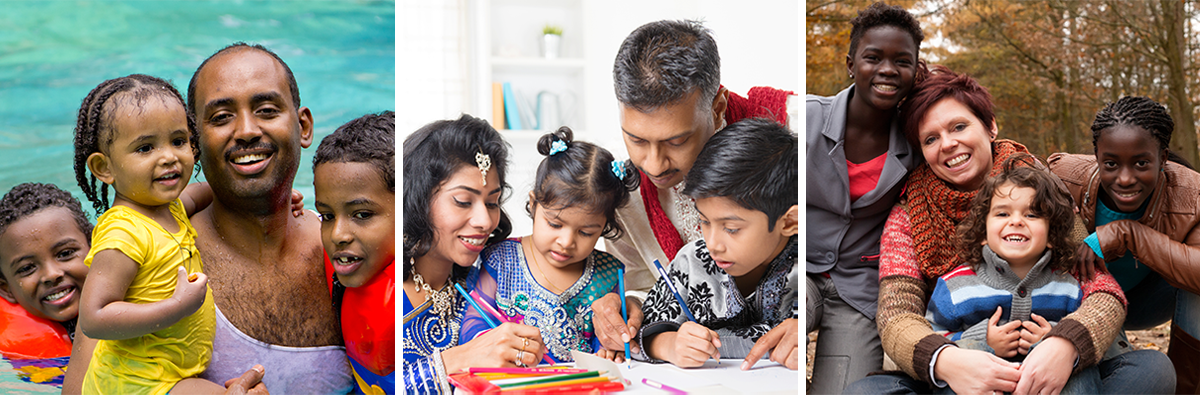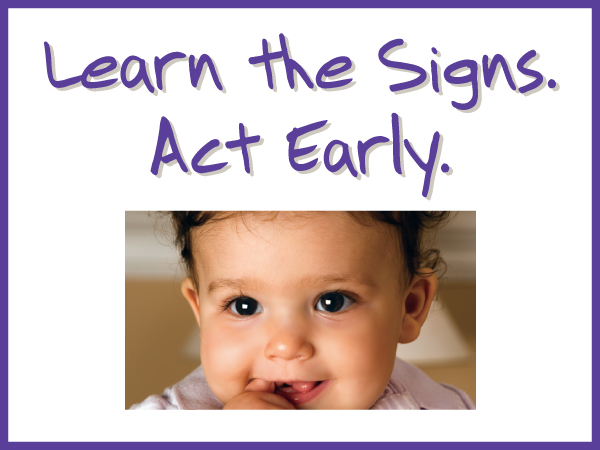Child and Family Development

The Child and Family Development program provides resources and training for early care and learning professionals and families on topics related to child development and family engagement.
CHAT ABOUT CHILDREN: AN EDUCATIONAL SERIES FOR FAMILIES
Monitoring Development with Learn the Signs. Act Early.
Families will learn about developmental monitoring and developmental milestones, why it’s important, and free resources available through Learn the Signs. Act Early.
My Daily Routine: Supporting Security and Predictability through using Schedules
Families will learn how to help their child navigate daily activities using visuals, helping children adapt to a home-based schedule that has a variety of activities both structured and non-structured.
Creating Connections: Building Your Child's Brain
Families will learn about early brain development and how talking to and playing with their child helps to build their baby’s brain.
Play with Me! Engaging Children
Families will learn how to keep children engaged in activities during those times where independence is needed.
From Talking to Reading: How Early Language Builds Literacy
Families will learn about the connection between early language and early literacy, and how serve and return helps build their child’s communication and literacy skills.
The Power of Choice
Families will learn how to build children’s independence by giving developmentally appropriate choices throughout the day.
DECAL FAMILY PEER AMBASSADORS
DECAL Family Peer Ambassadors are fathers, mothers, custodial grandparents, foster parents, stepparents or guardians of young children in licensed child care or
early intervention programs. They attend training about child development, quality early care and learning, and learn about statewide and community resources
for families with young children. Then, they share this information with families at community events. Family Peer Ambassadors also provide
input about DECAL’s websites and tools designed for families. Family Peer Ambassadors receive stipends for their participation in the program.
Email us at childdevelopment@decal.ga.gov for more information.
DEVELOPMENTAL MILESTONES AND MONITORING
Monitoring children’s development is an important part of helping them learn and grow. Children’s development can be monitored by watching how they play, learn, speak, and act. By monitoring a
child’s developmental milestones- skills most children can do at a certain age, we can tell if their development is on track or if they need some extra support. Getting support early is a
critical part of helping a child reach their full potential.
FAMILIES: Find information about developmental milestones and monitoring here.
ECE PROFESSIONALS: Find information about developmental milestones and monitoring
here.

Useful Links
Child Development & School Readiness:
National Association for the Education Young Children (NAEYC) has research-based resources, tips and ideas for families—from child development to reading,
writing, music, math, and more. https://www.naeyc.org
Raising Readers has tips for building literacy skills in children, as well as activity kits and book recommendations.
https://www.raisingreaders.org/understanding-early-literacy/establishing-early-literacy/
Sesame Street offers toolkits on a wide variety of topics from brain development to eating on a budget https://www.sesamestreet.org/toolkits
Talking is Teaching has fun tips and resources grounded in the best science, to help you talk, read, and sing with your child every day. https://talkingisteaching.org/
Vroom helps you do more with your shared moments. Add learning to mealtime, bath time, bedtime, or anytime with 1,000+ fun, free activities. https://www.vroom.org/
Early Intervention Support:
Babies Can’t Wait is Georgia’s early intervention program that offers a variety of coordinated services for infants and toddlers with special needs, from birth to three years-of-age and their families.
https://dph.georgia.gov/Babies-Cant-Wait
Parent to Parent of Georgia supports Georgia families and individuals impacted by disabilities or special health care needs through resources, a helpline and activities.
https://www.p2pga.org
Georgia Department of Early Care and Learning has an inclusion site which contains links to various state and national resources and documents to support
inclusion for children with disabilities in child care programs. They also have a helpline to help families find child care options and support for children with disabilities
and their families in their communities. To contact the Inclusion and Behavior Support Helpline, please call 1-833-354-4357 or email inclusion@decal.ga.gov
Head Start Center for Inclusion’s website contains a wealth of information on supporting and including children with special needs in the classroom and home.
http://headstartinclusion.org
Social and Emotional Development:
The Center on the Social and Emotional Foundations for Early Learning (CSEFEL) offers downloadable books and help on a variety of topics related to the social and emotional
development of young children. http://csefel.vanderbilt.edu/resources/family.html
National Association for the Education Young Children (NAEYC) has research-based resources, tips and ideas for families—from child development to reading, writing, music,
math, and more. https://www.naeyc.org
Georgia’s SEEDS for Success contains links to various state and national resources and documents to support teachers and families in their efforts to support children’s social, emotional, and behavioral development.
http://www.decal.ga.gov/InstructionalSupports/InclusionServices.aspx
Physical Development/Health: